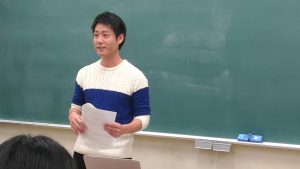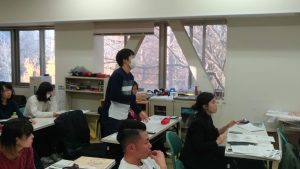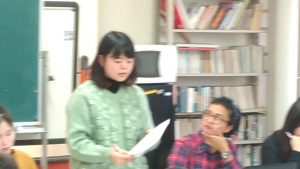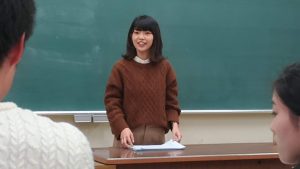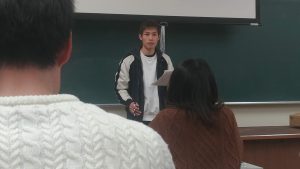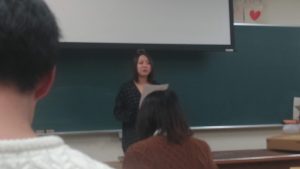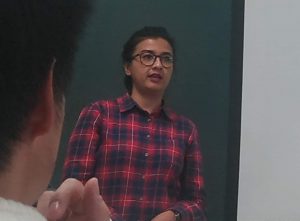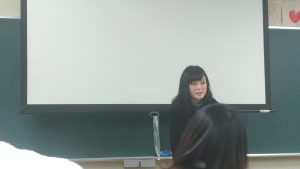On Wednesday, December 5, members of the Kingdom of James met with the People of the Brook to give their research presentations.It was an incredibly intellectually thrilling 100 minutes! The presentations and a quick summary are below.
- 14:52 – 15:05: Mr. Yukiya Sato: “A study on the development of intercultural communicative competence through a web conferencing system”
- Summary: Spent the year in Nepal. He explains intercultural communicative competence: “Ability to interact and communicate with people of a different culture” There are five parts. His research question was “How can we develop intercultural communicative competence through web conferencing?”
- The answer to the question is that students who took the initiative got ICC.
- James’ advice:Rephrase your research question or add one. It seems like you are investigating: What skills can students acquire from web conferencing?
- Question: Rutake and Ms. Fuji
- 15:05 – 15:20: Ms. Hiyori Kodama: “A Study of the Validity of Achievement Tests in Junior High Schools”
- She wants to investigate whether or not the current achievement tests being conducted at schools can measure students’ English ability.
- She was able to confirm that the purpose of tests is to see students’ efforts in class, but she thinks it is not related to measuring English proficiency.
- Question:
- Rutake: Who were the people who answered the questions?
- James: About the current state of English class content in HS.
- 15:20 – 15:35: Ms. Sae Kikuchi (Graduate): “Classroom Instruction in Primary School English for Raising Students’ Willingness to Write”
- She discussed the process of learning to read and write: alphabet – words – sentences. She talked about the purpose of English letters: it helps learners understand the sounds of English and their differences with Japanese. Her research question was , “To what extent can students develop their phonological awareness in elementary school English classes? To answer this question she did three pilot units each with a pre- and post- test. At the moment she is analyzing the tests.
- Questions:
- Yurina: She was discouraged to do writing in her teaching practice and she wanted to know the effect writing had on Sae’s students.
- Ayumi Hirano: How do you teach pronunciation? Hiyori: Do students confuse ローマ字 with the alphabet?
- Fuuka: How did you measure students’ willingness to write?
- 15:35 – 15:49: Mr. Inaba: “Career Education for Giving Dreams to Students”
- Mr. Inaba has some concerns about career education. He decided to come up with his own concept of “career education”. He posed 5 questions for an interview. From the results of the result, he discovered such things like: people are not pursuing their dreams! He researched the kinds of experiences that are related to making people pursue their dreams.
- Questions:
- Sayane: What people are participating in your research?”
- Erika: She wants to know what his evidence is for saying that career education is not related to helping students pursue their dreams. She also wants to know what kind of career recommendation he recommends.
- Yukiya: What is your definition of “dream”?
- Rutake: He gave a scenario. If a boy wants to be rich. What should the teacher tell him?
- James’ advice:
- You really need to find some papers/books about the current state of career education in Japan.
- You need to be clear about who your subjects are. You also need to audio record the interviews, if you have not done so.
- How to collect and analyze the data.
- Interview the participants
- Write the answers into a word file.
- Make a table in excel.
- If you want to finish by 12/23, write your introduction and literature by next week and bring it to the zemi. Finish all your interviews and enter the data into Microsoft word.
- 15:49 – 16:03: Mr. Naoto Kawaida: “A study of the Production of English WH-Questions by Japanese learners”
- He has experienced having difficulties making wh questions, so he decided to investigate what about -wh questions is difficult for Japanese learners. His literature review focuses on Second Language Acquisition theory. He talked about acquiring ‘chunks’ like in the Nakano ES, classes: “What do you like?” He wanted to analyze which wh utterances were difficult for students to say by giving them a oral test. He gave them Japanese sentences and asked participants to say them in English. He discussed which participants could and could not translate well.
- Questions
- Fuuka: Up until now, in the classes she took, wh questions were mainly writing. Why did Naoto choose to do speaking?
- James advice: Perhaps add the word “oral” into the title before “production.”
- 16:03 – 16:16: Ms. Seika Otomo “The stress of foreigners living in Japan.”
- She discussed that the number of non-Japanese is growing in Japan. She thinks that they must be experiencing various issues. She did a questionnaire and asked: What do you feel stressed about? How do you relieve yourself of this stress? What are the good parts of Japan? The biggest source of stress is “human relations.”
- Questions
- Yukiya: What countries did you want to investigate?
- Hiyori: How did you do the categories. did you give the respondents a choice?
- 16:16 – 16:: Ms. Veronica Dwi Puspasari (Teacher in Residence) “Analyzing Classroom Discourse: A Comparative Study of Teacher Trainees Teacher Talk in Indonesia and Japan Using SETT Framework”
- First, she compared the national curriculum of Japan and Indonesia. In both countries, communicative competence is the goal. To develop students’ communicative competence, teacher talk is essential. She compared the type of teacher talk of student teachers in Japan and Indonesia using the following four categories: Managerial mode, Materials mode, skills and systems mode, classroom context mode,
- Questions
- Yui: How do you compare student-teacher talk?
- 16:31 – 16:: Ms. Momoe Hatakeda: “An Analysis of the Task Properties of Activities in “Let’s Try” and “We can!”
- She investigated all the activities on Let’s try and We can and analyzed the task properties. She found that there were about 55 “Task activities” total. The four task properties are: 1) Meaning focused, 2) there is a gap, 3) students choose their own linguistic resources, 4) students have to attain a non linguistic outcome.
- Questions:
- Maki: What is a meaning focused activity?
- Shuhei: What is the criteria, did you design it yourself?
Next year, we look forward to presentations from both the People of the Brook and the Kingdom of James.


